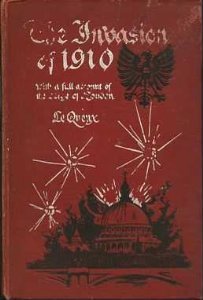The Invasion of 1910

First edition
|
|
| Authors |
William Le Queux H. W. Wilson |
|---|---|
| Country | United Kingdom |
| Language | English |
| Genre | Invasion literature |
| Set in | United Kingdom, 1910 |
| Publisher | E. Nash |
|
Publication date
|
1906 |
| Media type | Print (hardback) |
| OCLC | 59567217 |
| Text | The Invasion of 1910: With a full account of the Siege of London at Project Gutenburg |
The Invasion of 1910 is a 1906 novel written mainly by William Le Queux (along with H. W. Wilson providing the naval chapters). It is one of the more famous examples of invasion literature. It is viewed by some as an example of pre-World War I Germanophobia. It can also be viewed as prescient, as it preached the need to prepare for war with Germany.
The novel was originally commissioned by Alfred Harmsworth as a serial which appeared in the Daily Mail from 19 March 1906. According to German historian Sir Richard Evans, the paper built up "mass alarm" by dressing its London newspaper vendors as Prussian soldiers complete with pickelhaube helmet and placards showing maps of where the 'troops' would be next day. The rewrite of the story, featuring towns and villages with large readership of the Daily Mail, greatly increased the newspaper's circulation and made a small fortune for Le Queux; it was translated into twenty-seven languages, and over one million copies of the book edition were sold. The idea for the novel is alleged to have originated from Field Marshal Earl Roberts, who regularly lectured English schoolboys on the need to prepare for war.
To Le Queux's dismay, a pirated and abridged German translation (with an altered ending) appeared the same year: Die Invasion von 1910: Einfall der Deutschen in England translated by Traugott Tamm.
In Le Queux's earlier novel, The Great War in England in 1897, it is France which invades Britain as an implacable enemy. In that book's plot, German soldiers land in Britain as allies coming to help repulse the French invasion, and are welcomed as saviours. In between Le Queux's two disparate depictions of an invaded Britain, the Entente Cordiale of 1904 changed the diplomatic and military landscape.
The book takes the form of a military history and includes excerpts from the characters' journals and letters and descriptions of the fictional German campaign itself.
...
Wikipedia
